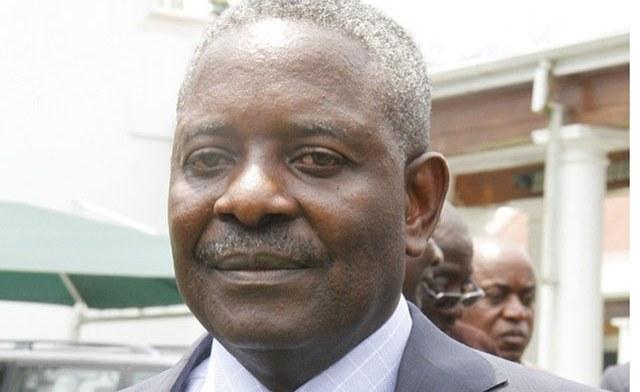News / National
Mugabe's former spy boss reflects on short stint as Justice Minister
12 Oct 2024 at 11:00hrs |
0 Views

In his recently released autobiography, One Among Many: My Contribution to the Zimbabwean Story, former Central Intelligence Organisation (CIO) Director-General Happyton Bonyongwe has revealed that he would have declined the ministerial position had he been consulted by the late former President Robert Mugabe before the appointment.
Mugabe appointed Bonyongwe as Justice Minister on October 9, 2017, in a surprising move aimed at realigning political loyalties in the face of a looming coup. His tenure was brief, lasting only seven weeks—potentially making him the shortest-serving minister since Zimbabwe's independence in 1980.
Bonyongwe expressed his apprehensions about entering the political arena, stating that he had always preferred to operate in the shadows of the intelligence community. In his autobiography, he recounted his interactions with politicians during his time as Director-General, which left him disillusioned. "I have never liked politics. I had interacted with politicians as DG and for the most part, I did not like what I saw," he wrote.
He revealed that Mugabe had previously approached him about entering politics on two occasions: once in 2003 before he became DG and again in 2015 when his contract was renewed. Both times, Bonyongwe declined the offers.
Reflecting on his unexpected appointment in 2017, he admitted that he had serious reservations. "Truth be told, I would have refused the ministerial appointment in 2017 had the president asked me first, but he did not," he wrote. "As far as I was concerned, a career in politics would most probably end badly due to the shenanigans in government and Zanu PF at the time. Factionalism had reached fever pitch, and reports about the divisions in the state that we were receiving at the CIO were disquieting."
Bonyongwe's revelations shed light on the complex and often turbulent dynamics of Zimbabwe's political landscape, especially during the tumultuous period leading up to the military coup that eventually ousted Mugabe from power. His memoir provides a unique perspective on the challenges faced by those in positions of authority within the country’s intelligence and political sectors.
Mugabe appointed Bonyongwe as Justice Minister on October 9, 2017, in a surprising move aimed at realigning political loyalties in the face of a looming coup. His tenure was brief, lasting only seven weeks—potentially making him the shortest-serving minister since Zimbabwe's independence in 1980.
Bonyongwe expressed his apprehensions about entering the political arena, stating that he had always preferred to operate in the shadows of the intelligence community. In his autobiography, he recounted his interactions with politicians during his time as Director-General, which left him disillusioned. "I have never liked politics. I had interacted with politicians as DG and for the most part, I did not like what I saw," he wrote.
He revealed that Mugabe had previously approached him about entering politics on two occasions: once in 2003 before he became DG and again in 2015 when his contract was renewed. Both times, Bonyongwe declined the offers.
Reflecting on his unexpected appointment in 2017, he admitted that he had serious reservations. "Truth be told, I would have refused the ministerial appointment in 2017 had the president asked me first, but he did not," he wrote. "As far as I was concerned, a career in politics would most probably end badly due to the shenanigans in government and Zanu PF at the time. Factionalism had reached fever pitch, and reports about the divisions in the state that we were receiving at the CIO were disquieting."
Bonyongwe's revelations shed light on the complex and often turbulent dynamics of Zimbabwe's political landscape, especially during the tumultuous period leading up to the military coup that eventually ousted Mugabe from power. His memoir provides a unique perspective on the challenges faced by those in positions of authority within the country’s intelligence and political sectors.
Source - online
Join the discussion
Loading comments…





































